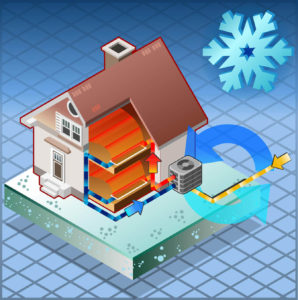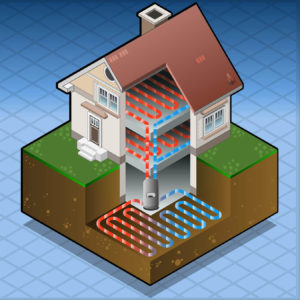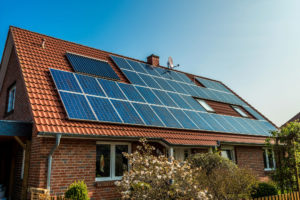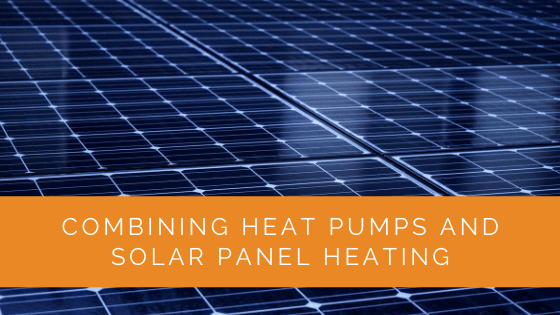As we move towards a future that prioritizes energy efficiency and sustainability, the integration of heat pumps and solar panel heating systems has emerged as a game-changer in the realm of home heating and energy consumption. This partnership has the potential to revolutionise the way we heat our homes, while also contributing to a greener future. In this article, we will delve deeper into the intriguing synergy between air-source and ground-source heat pumps and solar panels and explore the many benefits, practical considerations and potential outcomes of integrating these cutting-edge technologies.
At the heart of this partnership is the drive to reduce carbon footprint and save costs. Homeowners looking for a cost-effective and eco-friendly way to heat their homes can benefit from this combination. With a focus on informative and accessible language, you will discover how the eco-friendly partnership of heat pumps and solar panel heating can provide not only warmth but also substantial savings. We will help you navigate the challenges of integrating these technologies and show you how this cutting-edge combination can help you achieve your sustainability goals while keeping you comfortable all year round.
Contents
- 1 Key Takeaways
- 2 What Is an Air Source Heat Pump?
- 3 The Benefits of Using an Air Source Heat Pump
- 4 What is a Ground Source Heat Pump?
- 5 The Benefits of Using a Ground Source Heat Pump
- 6 Integrating Solar Panels and Heat Pumps
- 7 How Many Solar Panels Will You Need?
- 8 Benefits of Panels + Heat Pump
- 9 Solar Panels + Ground Source Heat Pumps with 26kW and 25kW Capacity (For Hot Water)
- 10 Case Study: Integrating Solar Panels with Heat Pumps for Enhanced Energy Efficiency
- 11 Expert Insights From Our Solar Panel Installers About Combining Heat Pumps and Solar Panel Heating
- 12 Discover the Power of Solar with Solar Panels Network
- 13 The Bottom Line
Key Takeaways
- Solar panels in the UK have exceeded 4GW capacity, with half a million households using them for electricity generation.
- Combining solar panels with air or ground source heat pumps can significantly reduce electricity bills and environmental impact.
- The number of solar panels needed depends on various factors, including roof space and heating requirements, and this combination can provide efficient and eco-friendly heating.
What Is an Air Source Heat Pump?
An air-source heat pump is a unique system that uses natural air to heat your space. In essence, it has reversible anatomy that the heat source during the heating more.
Similarly, you can use air-source heat pumps with a cooling mode. It has a heat exchanger in its external body, as used by air conditioners.
Fun Fact: It has somewhat similar functionality to a boiler.

The Benefits of Using an Air Source Heat Pump
Air source heat pumps have essential advantages that you need to look into:
- Low carbon footprint during energy consumption
- Easy installation and low maintenance
- Saves energy bills
- Used for hot water generation and home heating
If you combine solar panels with air-source heat pumps, you can skyrocket the advantages. Gone are the days of using fossil fuels to power your home, and you will not incur heating costs.
The heat produced will be purely from the solar cells. The benefits of this combination are:
- It saves your electricity bill significantly greater
- You will achieve efficiency rates by using less electricity from fuels
- It protects you from rising electricity costs in the near future
- You get incentives for using a combined system with renewable energy
The eco-friendliness of an air source heat pump is exponential when combined with solar panels.
What is a Ground Source Heat Pump?
Unlike an air-source heat pump, a ground-source heat pump is infinitely more effective. It can save energy as this heating and cooling system integrates with the buildings. This heat pump offers the maximum output because it sources the heat from the ground and transfers it to the building. It takes advantage of the energy-relative constancy found in the ground temperatures in the UK.
For example, this heat pump has a mechanical anatomy that circulates the thermal energy through a liquid solution. This solution travels through the ground loops and heats your home or generates hot water.
Fun Fact: This heat pump is called a geothermal pump in many parts of the world.

The Benefits of Using a Ground Source Heat Pump
Most of the benefits of a ground-source heat pump are similar to an air-source heat pump. The heating system alone will give you summer and winter advantages in your house like:
- It consumes 25% less energy than a conventional heat pump
- It is an efficient way to heat or cool your home in the UK
- It is low maintenance and has a heating capacity like no other
- It decreases fuel emissions, making it safer for the environment
Now, if you integrate a solar panel array with these heat pumps, you will harness the power of the sun and the planet. This heating system combined will help regulate your house temperature throughout the seasons. It will use sunlight from the solar panels’ power to control the temperature.
This combined system will reduce the electricity input bills while providing hot water and a hot air source under your roof.
Integrating Solar Panels and Heat Pumps
You can use solar panels as an air source heat pump and a geothermal pump. Your heating problems and electricity bills will be a thing of the past once you install such a system.
It will ensure that your heating and hot water requirements are met in an environmentally friendly manner. Ideally, solar panels can produce electricity from the sun to power the hot pump system under your roof. Yet, the amount of energy you generate will depend on the sun and the size of your solar array.
If you use solar thermal panels, it will effortlessly warm your water and reduce electrical power consumption. In contrast, if you install a PV system, you can convert solar energy to electricity. Combining these will help you harness the sunlight and power the pumps without burning harmful fuels.
Will it Work?
In the UK, the average system will be 4kW, the maximum electricity output produced on a sunny day. It can differ depending on the weather conditions and make more during the afternoon. 4kW = 3,400 kWh/Year, taking 26m2 of your roof space.
On average, your home will use 3,700kWh every year. It means that a 4kW solar panel will provide you with enough electricity, but you will need to borrow 300kWh from the grid.
Most of the old UK homes will utilise a boiler. Hence, gas consumption might be higher, whereas electricity usage will be lower. If you install cost-effective heat pumps, the electricity usage will be higher.
The ideal customers of such pumps will tell you that the CoP from four usages is 3,000 kWh/year. Hence, solar panels are unlikely to power heat pumps and other electrical appliances in your home. It means that your solar panels might generate enough energy to power the heat but not enough to power your technology.
You will need the UK electrical grid assistance to power the rest of your house.

How Many Solar Panels Will You Need?
You will benefit from solar panels and pump combos that take 26m2 or more of your roof space. Solar panels will have variable capacities in the UK, depending on their size. Usually, it is 1.6 m tall x 1 m wide with a thickness of 40 mm.
Most solar systems will have a wide surface for proper function, and the cost will vary.
The number of solar panels required will also depend on the location, the unit usage and location. Once installed, removing or replacing it will be costly. An average UK home will require four solar panels to create a 1kW system that produces 250W.
- 4 panels = 1kW
- 8 panels = 2kW
- 12 panels = 3kW
- 16 panels = 4kW
- 20 panels = 5kW
- 24 panels = 6kW
- Twenty-eight panels = 7kW, and so on.
The 4kW system is ideal for a home with four people. It means that combining solar panels with your installed unit of pumps will depend on the people at your home. Therefore, you will need an expert to assess your roof or home and estimate the requirements.
Benefits of Panels + Heat Pump
After the initial investment, you can get off the grid with 50% of your electricity requirement. The gas emission will dissipate, and your boiler requirement will be minimal. Not only does it offer higher efficiency rates, but it also reduces the overall costs of maintenance.
This symbiotic relationship will be fruitful during the cold weather when you require to produce high amounts of heat. Hence, the benefits are:
- You get full-scale heating with lower costs
- Lower electricity consumption rate
- Flexibility with heat generation
- It can have cheaper and eco-friendly energy
- Reduced grid reliance and gas emissions/carbon footprint
Fun Fact: Your ground source pumps can disregard the excessive heat and store it in the solar collectors for the next season.
Solar Panels + Ground Source Heat Pumps with 26kW and 25kW Capacity (For Hot Water)
- Heating properties – It can produce heat for areas of 400 to 600 m2
- Requirement of solar collectors – 16 pieces
- The capacity of tank batteries – 2,000 litres
- The volume of the tank – 200 litres
- Nominal heating capacity of solar panels – 20kW
- The output of heat pumps – 25kW
- Approximate price – £14,000+
Case Study: Integrating Solar Panels with Heat Pumps for Enhanced Energy Efficiency
Background
At Solar Panels Network, we aim to deliver cutting-edge, sustainable energy solutions. Our focus on renewable energy has led us to explore the potential of combining solar panels with heat pump systems. This case study outlines a recent project where we integrated solar panel heating with air-source heat pumps for a residential property, showcasing the synergy between these technologies and their impact on energy efficiency and sustainability.
Project Overview
The project involved a four-bedroom detached house in a suburban area, aiming to reduce its carbon footprint and energy costs. The homeowners sought an efficient and eco-friendly heating solution that could provide reliable year-round performance. Our team recommended combining solar panels with an air-source heat pump system to meet these goals.
Implementation
- System Design: We assessed the property’s energy needs and roof space, designing a 5kW solar panel system to power the air-source heat pump.
- Installation: Our installation team mounted the solar panels and integrated them with the heat pump system, ensuring optimal positioning for maximum sunlight exposure.
- Configuration: The heat pump system was calibrated to work seamlessly with the solar panels, allowing for efficient energy transfer and storage.
- Monitoring: A monitoring system was installed to track energy production and consumption, providing real-time data for performance optimisation.
Results
- Energy Savings: The homeowners saw a 50% reduction in their electricity bills within the first six months.
- Carbon Footprint Reduction: The integration led to a significant decrease in carbon emissions, aligning with the homeowners’ sustainability goals.
- System Efficiency: The combined system demonstrated high efficiency, particularly during peak sunlight hours, maximising the use of renewable energy.
Summary
The integration of solar panels with an air-source heat pump system proved to be a highly effective solution for the homeowners, providing both environmental and economic benefits. This setup capitalised on the natural synergy between the two technologies, offering a reliable and sustainable heating solution. At Solar Panels Network, we continue to advocate for such innovative energy solutions, empowering our clients to make eco-friendly choices that also deliver substantial cost savings.
Expert Insights From Our Solar Panel Installers About Combining Heat Pumps and Solar Panel Heating
Integrating heat pumps with solar panels is a sustainable choice that not only reduces your carbon footprint but also optimises energy efficiency. This combination harnesses the natural energy from the sun, providing a reliable and renewable source of heating for your home.
Senior Solar Installer
The synergy between solar panels and heat pumps offers homeowners the dual benefit of reduced energy bills and environmental impact. By utilising solar energy to power heat pumps, we can significantly cut down on electricity costs and reliance on fossil fuels.
Lead Installation Engineer
Combining heat pumps with solar panels is an excellent investment for those looking to enhance their home’s energy efficiency. This setup maximises the use of renewable energy and provides a stable and efficient heating solution throughout the year.
Energy Solutions Specialist
Discover the Power of Solar with Solar Panels Network
Are you navigating the world of solar installations? Look no further than Solar Panels Network, the UK’s trusted partner in harnessing the sun’s potential. Our dedication goes beyond just installations; we’re on a mission to transform how homeowners and businesses across the UK perceive and utilise energy. By choosing us, you’re reducing your carbon footprint and making a smart financial move that promises savings for years ahead. Contact us today and embark on your solar journey.
The Bottom Line
Install panels if you have a current heating source and need to make it more efficient. The energy produced will be from the sun; the system will help you get off the grid while gaining incentives.
The most significant benefit of integrating your heat pumps with solar is the more electricity generation and energy-saving aspect. Your heat pump can be part of a greener, more eco-friendly heating system without fossil fuels.
You will either have an air-source heat pump or a ground-source heat pump. Either way, both will work efficiently with a solar panel system. You must use more than 26m2 or more of your space to make a functional system. Similarly, you must assess the requirements, like the number of people and heat usage.
But how many solar panels will you need? It all depends on your roof space, the people in your home and your heating requirements.
About the Author
Solar Panels Network stands at the forefront of solar energy solutions, driven by a team of seasoned solar engineers and energy consultants. With over decades of experience in delivering high-quality solar installations and maintenance, we are committed to promoting sustainable energy through customer-centric, tailored solutions. Our articles reflect this commitment, crafted collaboratively by experts to provide accurate, up-to-date insights into solar technology, ensuring our readers are well-informed and empowered in their solar energy decisions.

